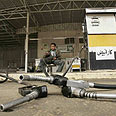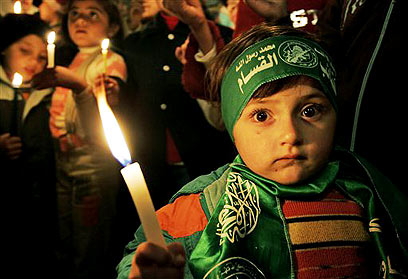
UN Security Council to hold emergency meeting on Gaza
Fifteen-member body to meet Tuesday morning at request of Arab UN ambassadors, 57-member Organization of the Islamic Conference. UN Secretary-General Ban Ki-moon telephones Prime Minister Olmert, expresses his concern over situation. Meanwhile, senior defense official claims dramatic drop in rocket attacks in last 48 hours attests to effectiveness of closure on Gaza
The UN Security Council was to meet in emergency session Tuesday on the humanitarian crisis triggered by Israel's crippling blockade of the Gaza Strip, in response to the firing of rockets into the Jewish state.
The 15-member body was to meet at 10 am (1500 GMT) at the request of Arab UN ambassadors and the 57-member Organization of the Islamic Conference.
The decision to hold the emergency session was made during closed-door consultations late Monday amid a growing international outcry at what the European Union termed the "collective punishment" of Gaza's 1.5 million residents.
The strong international reaction and warnings of a humanitarian crisis led Israel Monday to ease its blockade of Gaza, allowing in some fuel and medicine.
Defense Minister Ehud Barak authorized the impoverished territory to be re-supplied from Tuesday with fuel for its sole electricity plant which was forced to shut down and with medicine for its hospitals on Wednesday.
Palestinian UN observer Ryad Mansour told reporters Monday that he wanted the 15-member council to adopt a resolution or a statement demanding that Israel lift "its crippling, cruel siege on the Palestinian civilian population."
UN Secretary-General Ban Ki-moon telephoned Prime Minister Ehud Olmert on Monday evening and expressed his concern over the situation in Gaza.
'Palestinians got the message'
A senior defense official told Ynet Monday evening that the sharp decrease in rocket attacks from Gaza in the last couple of days proves that "the Palestinians got the message," conveyed by Israel through the closure on the Strip.

Lights out in Gaza (Photo: Reuters)
"We got the message across. Hamas understood the equation: A continuation of the rocket fire would lead to Israeli pressure against armed groups and civilians. We do not plan to cause a humanitarian catastrophe, but they now realize they will not get fuel or other luxuries as well.
"We will transfer diesel fuel to the power plant, as well as medicines, but not fuel for cars or other commodities. The one-time gesture was meant to aid the civilian population, because we do not wish to harm innocent civilians. But the condition remains – only an end to rocket fire would enable a return to normal life in the Gaza Strip."
Palestinians: Gesture is insufficient
Meanwhile, a Hamas government spokesman, Taher al-Nunu claimed that Israel's decision to allow the fuel shipment was a temporary and insufficient move, and the result of pressure by the Palestinians and the Arab world.
"A renewal of fuel supply is not enough, because the fuel is just a small part of the siege, and because the crossings will remain closed," al-Nunu said, and urged the Arab world to further pressure Israel into lifting the closure.
Hamas' political leader Khaled Mashaal, on the other hand, welcomed Israel's decision and called it "a move aimed at righting a wrong." In an interview to Hamas' TV station, Mashaal praised the efforts "of all those in the West Bank and all the organizations worldwide that pushed for this decision."
Mashaal added that "our brothers in the Egyptian leadership have informed me that the crisis would be solved tomorrow, and I told then that the objective should be to lift the siege imposed on the Strip."
Ali Waked and AFP contributed to this report










